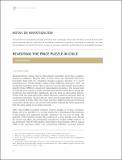Nota de Investigación
Revisiting the price puzzle in Chile
Date
2017-04Abstract
Economic theory argues that a contractionary monetary policy has a negative impact on inflation. Despite this, evidence from the empirical literature frequently finds that the estimated impulse-response function of a vector autoregressive (VAR) model implies that inflation increases after an unexpected monetary shock. This is referred to as the price puzzle and was first noted by Sims (1992) for a number of industrialized countries. The present note revisits the price puzzle in Chile with data from 2002 to 2016. Even though the results are not statistically significant, they do show an interesting feature. In line with the main part of the earlier literature, inflation increases after an unexpected monetary shock in the pre-crises period suggesting the presence of a price puzzle in Chile. After the crisis, however, inflation decreases following a monetary shock. This is in contrast with earlier evidence for Chile suggesting that the price puzzle is no longer present.
Collections

The following license files are associated with this item:

